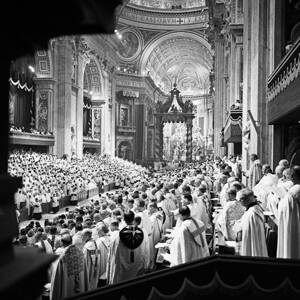Though the forecasters had it that the Second Vatican Council would begin with one of several other topics, the decision to take liturgy as its first matter for study is commendable on several counts.
As a bulletin from the Council's press office implied, the move underscored the fact that internal renewal of the Church was the bishops' primary concern. Since liturgy is the public prayer life of the Church, efforts to ensure proper vigor and understanding of worship rank as an important expression of that concern. Moreover, the wide interest in liturgy and the liturgical movement guaranteed that the Council's first round of discussions would exercise a special appeal for the general public.
The decision may also have been prompted by the fact that the liturgy has received unusually intensive study from scholars in recent decades. As a result, it seems that the preparatory commission on the liturgy was able to produce a list of concrete proposals for clarification of issues and enactment of decrees. This commission's experience also indicated that there were relatively few liturgical matters which could not he framed in such a manner as to win approval of a clear majority of the conciliar Fathers.
It may be, too, that the prospect of turning immediately to a "spiritual" topic like the liturgy appealed to many as a welcome change from the organizational details of the first week. Many also hoped that this move would counteract any unfortunate impressions created hy overzealous reports on the "political" aspects of the Council in its preliminary stage. As events have in fact proved, the much discussed election of members to the Council's working commissions went off without excitement, let alone a "revolt." Moreover, its results scarcely lent support to prior outside speculation over attempts, from any quarter, to block selection of one or other category of nominees.
In Rome and within the Council itself, one had ample evidence before the discussions ever opened that the Church had already begun to "update" its liturgy. As Fr. Frederick R. McManus, former head of the American Liturgical Conference and a consultant to the Council, remarked in an authoritative background story for the NC News Service, the many Sunday evening Masses throughout the Eternal City testify to what has been slowly growing in recent years. He pointed also to the fact that the daily Mass opening each general session of the Council is a "dialogue" Mass. In other words, the congregation of bishops and others in attendance respond in unison and, in some places, pray along with the celebrant, who offers the Holy Sacrifice facing the people.
Behind all questions about changing the Church's rituals lay a concern to help all "the praying people of God" to understand the liturgy and thus to derive fuller spiritual benefit from it. When one realizes that in Latin America alone the largely Catholic population can he expected to more than double in the next four decades, future difficulties come alive. Over a period of less than forty years, some 400 million new Christians will there await introduction to Catholic faith and practice. Every aspect of the Church's life must he reviewed with an eye to the needs of that continent, if to no others. Clearly, the Council's concern with the liturgy arose, not from an antiquarian interest, but from the heart of its pastoral and apostolic charge.








